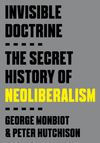Sublime
An inspiration engine for ideas
This suggests a general operating principle similar to the Leopoldian land ethic, often summarized as “what’s good is what’s good for the land.” In our current situation, the phrase can be usefully reworded as “what’s good is what’s good for the biosphere.” In light of that principle, many efficiencies are quickly seen to be profoundly destructive,
... See moreKim Stanley Robinson • The Ministry for the Future: A Novel

This process of indirect land-use change is essentially why biofuels have proven to be no climate solution. The defenders of localism are in thus little different to the biofuels industry, clinging to a particular agricultural practice long after the evidence has shown it to actually exacerbate climate change.
Leigh Phillips • Austerity Ecology & the Collapse-Porn Addicts: A Defence Of Growth, Progress, Industry And Stuff
The Invisible Doctrine: The Secret History of Neoliberalism by George Monbiot, Peter Hutchison
app.thestorygraph.com
On top of nuclear war, in the coming decades humankind will face a new existential threat that hardly registered on political radars in 1964: ecological collapse. Humans are destabilizing the global biosphere on multiple fronts. We are taking more and more resources out of the environment while pumping back into it enormous quantities of waste and
... See moreYuval Noah Harari • 21 Lessons for the 21st Century
This is what a more-than-human politics actually looks like: the careful and conscious attention to the needs and desires of others, the acknowledgement of their agency and value, and the willingness to adapt our existing structures of society and place to better account for all of us.
James Bridle • Ways of Being: Animals, Plants, Machines: The Search for a Planetary Intelligence
This suggests a general operating principle similar to the Leopoldian land ethic, often summarized as “what’s good is what’s good for the land.” In our current situation, the phrase can be usefully reworded as “what’s good is what’s good for the biosphere.” In light of that principle, many efficiencies are quickly seen to be profoundly destructive,
... See moreKim Stanley Robinson • The Ministry for the Future: A Novel
Medium • 11: Post-traumatic urbanism and radical indigenism
The journalist Richard Fisher helpfully showed that some 100 billion people have lived since our species appeared. Nearly 8 billion are alive today, but these numbers are dwarfed by the 135 billion likely to be born in the next millennium, let alone the 6 or 7 trillion who might be born over the next 50,000 years.5 Ignoring their lives and needs is
... See more